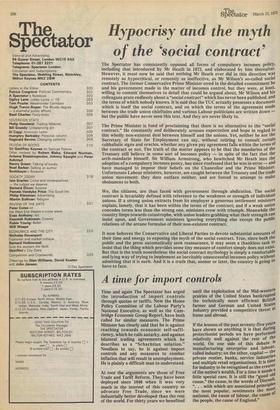Hypocrisy and the myth of the 'social contract'
The Spectator has consistently opposed all forms of compulsory incomes policy, including that introduced by Mr Heath in 1972, and elaborated by him thereafter. However, it must now be said that nothing Mr Heath ever did in this direction was remotely as hypocritical, or remotely as ineffective, as Mr Wilson's so-called social contract. The former Conservative Prime Minister erred in the detailed commitment he and his government made in the matter of incomes control, but they were, at least, willing to commit themselves to detail that could be argued about. Mr Wilson and his colleagues prate endlessly about a "social contract" which has never been published, and the terms of which nobody knows. It is said that the TUC actually possesses a document which is itself the social contract, and on which the terms of the agreement made between the trade union chieftains and various Labour politicians are written down -but the public have never seen this text. And they are never likely to.
The Prime Minister is fond of proclaiming that there is no alternative to the "social contract." He constantly and deliberately arouses expectation and hope in regard to this wholly non-existent deal between himself and the unions. Yet, neither he nor the Secretary of State for Employment can say, without retiring to consult certain cabbalistic signs and oracles, whether any given pay agreement falls within the terms of the contract or not. The truth of the matter appears to be that the mandarins of the Treasury still believe in some sort of incomes policy — in spite of the fact that the arch-mandarin himself, Sir William Armstrong, who bewitched Mr Heath into the adoption of a compulsory incomes policy, has since confessed that he was in error — and have managed to impose their beliefs on the Chancellor and the Prime Minister. Unfortunate Labour ministers, however, are caught between the Treasury, and the trade union movement: they dare outface neither, and are forced to attempt to make obsisances to both.
We, the citizens, are thus faced with government through abdication. The social contract is invariably defined with reference to the weakness or strength of individual unions. If a strong union extracts from its employer a generous settlement ministers 321 explain, lamely, that it has been within the terms of the contract; and if a weak union concedes terms less than the strong one, ministers crow with triumph. Meanwhile the country limps towards catastrophe, with union leaders grabbing what their strength can insist upon, and Government ministers ignoring everything else except the public relations of the arcane formulae of their non-existent contract.
It now behoves the Conservative and Liberal Parties to devote substantial amounts of their time and energy to exposing the myth of the social contract. True, since both the public and the press automatically seek reassurance, it may seem a thankless task. to insist that the thing which provides some tiny measure of comfort simply does not exist. 325 But that is the truth nonetheless: the social contract mythology is simply a comfortable and lying way of trying to implement an inevitably unsuccessful incomes policy without admitting that it is such. And it is a truth that, sooner or later, the country is going t° have to face.


































 Previous page
Previous page